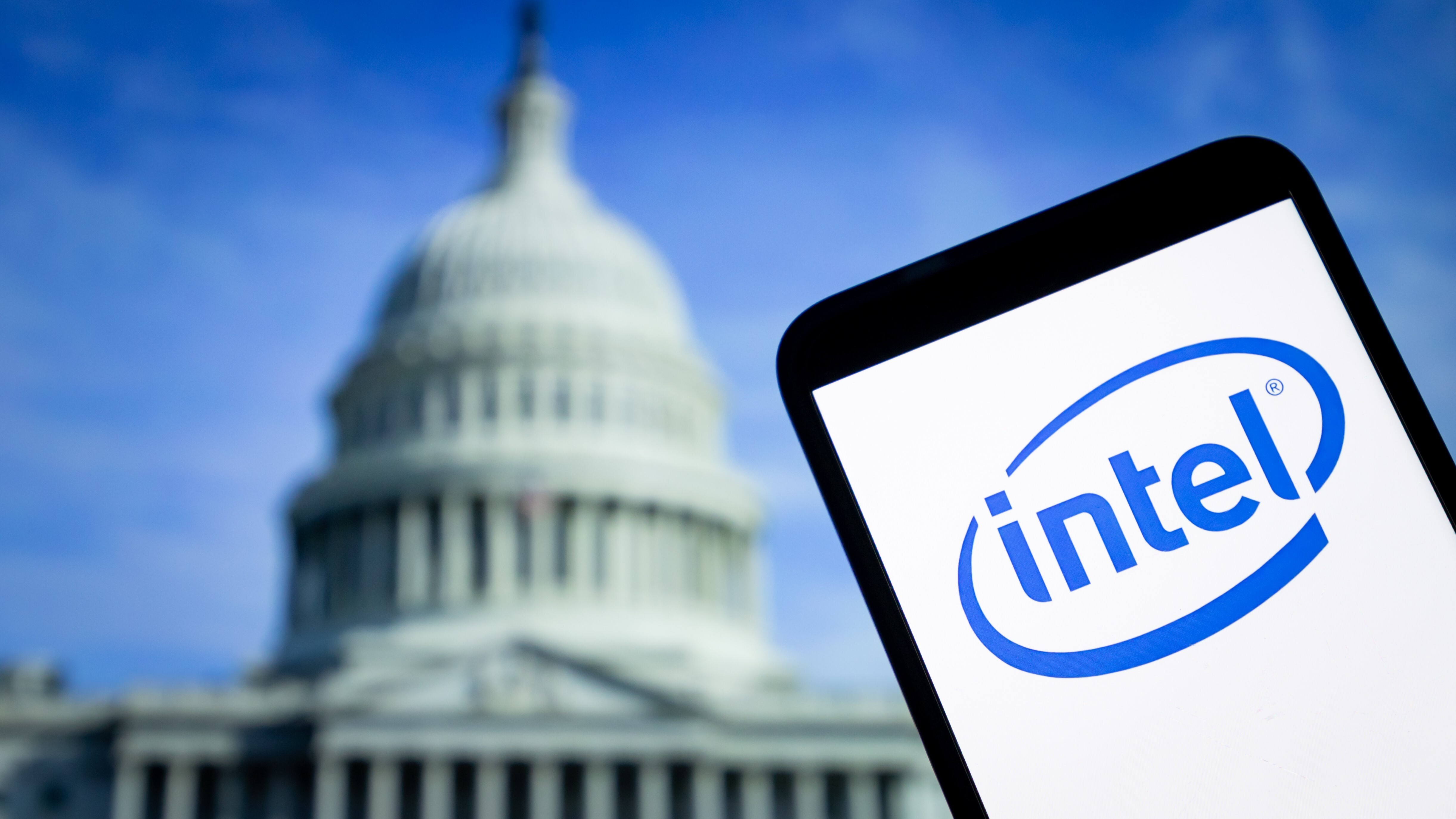Intel confirms it has already received $5.7 billion from US government, CFO claims the deal was to halt the sale of its chip fabs
The $5.7 billion investment will see the US government take a 10% stake in Intel, with the Commerce Department said to be ironing out the details.

Intel's chief financial officer has confirmed the company has received $5.7 billion from the Trump administration as part of a deal that sees the US government taking a 10% stake in the company, as per CNBC. Although this move is highly unprecedented, with some Republican lawmakers likening it to socialism, or communism, Intel claims it was part of a move to prevent it from selling its chip fabrication business.
Intel has fallen on tough times in recent years. It's lost many of its top performance positions to AMD, and its fabrication business has suffered under increasing competition from TSMC and Samsung. Although it still has exciting new chips in the works, and received a major investment from the last-government's CHIPS act, it was still considering selling the entire chip manufacturing arm of its business. That is, until the U.S. government stepped in.
Under the move, $8.9 billion of federal grants that Intel received as part of the CHIPS act was converted into equity in the business. The agreement also stated that if Intel ever sells more than 49% of its foundry business, that the government could purchase an additional 5% shares at $20 each, thereby discouraging Intel from doing so.
“I don’t think there’s a high likelihood that we would take our stake below the 50 percent, so ultimately I would expect [the warrant] to expire,” CFO David Zinsner told a Deutsche Bank conference on Thursday, via FT.
“I think from the government’s perspective, they were aligned with that: they didn’t want to see us take the business and spin it off or sell it to somebody.”
Intel has faced pressure to sell its chip manufacturing business as it has remained a loss leader for the company for several years. In 2024 alone, it lost $13 billion amidst increasing competition from TSMC and a lack of interest in Intel's cutting edge silicon. Although it can produce process nodes that are competitive with TSMC and Samsung, we learned in July that it was considering cancelling its 14A process designs if it couldn't secure a customer for them. Outright selling the fab business may also have been on the table.
Whatever the reverse of blood in the water is, other companies have clearly smelled it. Japanese investment company, Softbank, is investing $2 billion in Intel (after sniffing around to buy the foundry arm of its business), seemingly understanding that Intel won't be allowed to fail with such deep interest from the US government. This comes at a time of increasing nationalization around chip design and access to cutting-edge silicon for AI development and military use.
Get Tom's Hardware's best news and in-depth reviews, straight to your inbox.
In other fundraising initiatives, Intel has seen heavy downsizing and restructuring under new CEO, Lip-Bu Tan, and is reportedly selling off $1 billion of stock in its autonomous driving company, MobileEye, as well as selling a controlling stake in specialist chip design firm, Altera.
Follow Tom's Hardware on Google News, or add us as a preferred source, to get our up-to-date news, analysis, and reviews in your feeds. Make sure to click the Follow button!

Jon Martindale is a contributing writer for Tom's Hardware. For the past 20 years, he's been writing about PC components, emerging technologies, and the latest software advances. His deep and broad journalistic experience gives him unique insights into the most exciting technology trends of today and tomorrow.
-
dalek1234 I don't see anything here as being designed by US government to stop/prevent the sale of Intel fabs. All I see is the US government protecting its stake in Intel: "If you sell too many fabs, we want more shares from you in case our original 10% has lost some of its value."Reply
The CFO is just spinning the story.
Intel will eventually sell more than 50% of its fabs, or die quicker, and then just print more shares for US government. Intel gets money from sale of fabs, and more money from new shares it gave to US government. It's a win-win for both parties, and a lose for the rest of the shareholders who had their outstanding shares diluted, yet again. -
TerryLaze Reply
That would be insane because the gov/intel set the $20 per share in stone, if intel stock drops below that then the gov will be giving intel more money than the shares will be worth, they would not make back money they lost, they would lose even more money.dalek1234 said:I don't see anything here as being designed by US government to stop/prevent the sale of Intel fabs. All I see is the US government protecting its stake in Intel: "If you sell too many fabs, we want more shares from you in case our original 10% has lost some of its value."
It's only a win-win if you think that intel wants their stock to be diluted, keep in mind that "intel" also owns shares in intel....they also don't like losing money just as much as any of the "rest" of the shareholders you talk about.dalek1234 said:Intel will eventually sell more than 50% of its fabs, or die quicker, and then just print more shares for US government. Intel gets money from sale of fabs, and more money from new shares it gave to US government. It's a win-win for both parties, and a lose for the rest of the shareholders who had their outstanding shares diluted, yet again. -
dalek1234 ReplyTerryLaze said:That would be insane because the gov/intel set the $20 per share in stone, if intel stock drops below that then the gov will be giving intel more money than the shares will be worth, they would not make back money they lost, they would lose even more money.
You got me thinking, so I went back to the original "10% and cash, and 5% later 'if' " articles. It sounds like US Gov will just get 5% extra shares issues to them, without giving Intel any extra money.
TerryLaze said:It's only a win-win if you think that intel wants their stock to be diluted, keep in mind that "intel" also owns shares in intel....they also don't like losing money just as much as any of the "rest" of the shareholders you talk about.
I googled last week if Intel owns any of its own shares, and I didn't see anything to indicate that they do. I got a list of major shareholders, and Intel wasn't one of them. Then wondered if that's even a correct thing to search for:
I'm not an expert on this, and maybe somebody else who knows could chime-in (I don't feel like asking chat-gpt), but if a corporation buys back its own shares, the shares go out of circulation completely, therefore, increasing the value of the remaining shares since there is less of them floating around. "Buying-back shares" removes them from the market, so Intel doesn't actually own any of its own shares, but they could just issue them back in, thus diluting everybody else's.
Anyone? -
TerryLaze Reply
https://www.sec.gov/ix?doc=/Archives/edgar/data/50863/000005086325000129/intc-20250822.htmNope, it's $20 per share still.dalek1234 said:You got me thinking, so I went back to the original "10% and cash, and 5% later 'if' " articles. It sounds like US Gov will just get 5% extra shares issues to them, without giving Intel any extra money.
The Warrants will be exercisable only if, and from the date on which, the Company ceases to directly or indirectly own at least 51% of its foundry business, and will expire on the fifth anniversary of the Closing Date. Each Warrant represents the right to purchase one share of common stock at an exercise price of $20.00 per share, subject to anti-dilution adjustments for dividends, distributions, subdivisions, combinations or reclassifications.
Yes that's why put "intel" once in "" and once not.dalek1234 said:I googled last week if Intel owns any of its own shares, and I didn't see anything to indicate that they do. I got a list of major shareholders, and Intel wasn't one of them. Then wondered if that's even a correct thing to search for:
It's not intel as a company, but everybody that works at intel, and especially the higher ups all have intel shares and all care if the shares go up or down, lip bu tan had to buy 25 million in shares when he got appointed.
https://finance.yahoo.com/news/intel-ceo-stands-reap-more-110200859.html?guccounter=1 -
Trake_17 Yeah that's it for me. Too much drama at Intel and I definitely don't want my investments to get mixed into anything Trump is involved with. If stocks weren't already a bit like gambling, throw that man's insanity into the mix isn't for me. This is the camel's back breaking straw for me. I was looking forward to a chip manufacturing renaissance from Intel but I just don't want whatever Trump is baking up here.Reply -
Constellar We're all forgetting the hope that surrounded the company when Pat assumed control and wanted the fab end of the business to rise again. We can't forget how stupid the decision was for Intel to go completely fabless; well, that hope never left the company; it was merely buried under the stark reality of success presented by TSMC and Samsung. Now that Intel has this infusion, the hope is one again brought to life, and now the only thing that's needed is one simple component to ensure that TSMC's monopoly is broken up: a large customer.Reply
A major contract in Intel semiconductors is the only thing standing between Intel and complete success. -
Constellar Reply
Trump may be a failboat in many things, but he's been good in some things. Let history show that this decision will be on the good side of history. Sorry mods if this post is nearing the political end of the posting spectrum...Trake_17 said:Yeah that's it for me. Too much drama at Intel and I definitely don't want my investments to get mixed into anything Trump is involved with. If stocks weren't already a bit like gambling, throw that man's insanity into the mix isn't for me. This is the camel's back breaking straw for me. I was looking forward to a chip manufacturing renaissance from Intel but I just don't want whatever Trump is baking up here. -
Moores_Ghost I've said this since they announced the Chips act. They will not let Intel take Chips act money AND sell their fabs.Reply
So many stock bros talking about spinning off the fabs. I reminded them each time to look at the Chips act and got zero traction.
I hate to say it, but I did...
I thought it was obvious. -
TerryLaze Reply
Why have you been saying that?! I mean all the gov cares about is that it stays in US hands...Moores_Ghost said:I've said this since they announced the Chips act. They will not let Intel take Chips act money AND sell their fabs.
Also look above, there is a part in the agreement that actually deals with the consequences of intel selling the fabs, and the maximum punishment for intel would be that they would have to sell another 5% to the gov, at $20 per share.
There isn't even anything there about selling to domestic only.
Also they didn't let intel take chips act money at all...............................................they extorted stock from intel.